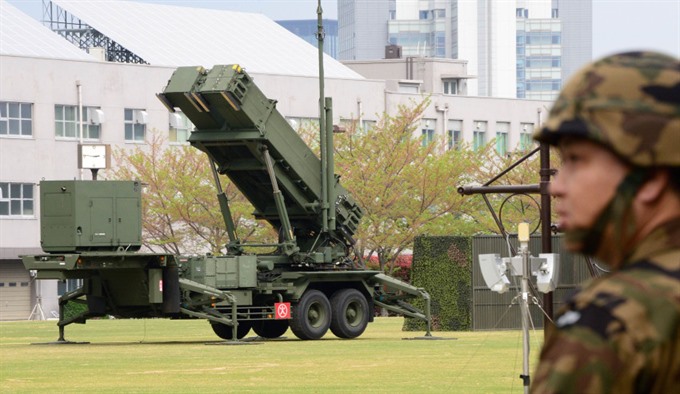Viet Nam News TOKYO — Japan will Tuesday deploy an additional missile defence system on its northern island of Hokkaido, a defence ministry spokesman said, days after North Korea launched a missile over the island.
"We are deploying a PAC-3 system at about noon" to a base of the nation’s Ground Self-Defense Force in the southern tip of Hokkaido, said Kensaku Mizuseki.
According to local officials, Japan has already deployed the Patriot Advanced Capability-3 missile defence system to another part of Hokkaido.
But Mizuseki declined to confirm where in Japan other PAC-3 systems were deployed, citing the sensitive nature of defence information.
The move comes with tensions on the Korean peninsula at fever-pitch after Pyongyang carried out its sixth nuclear test and fired two missiles over Japan in the space of less than a month, sparking emergency warnings to take cover.
North Korea has threatened to "sink" Japan into the sea and said Saturday that it sought military "equilibrium" with arch-enemy the United States by developing a full nuclear arsenal.
For his part, Japanese Prime Minister Shinzo Abe has said he would "never tolerate" the North’s "dangerous provocative action" and has urged the international community to ramp up pressure on Pyongyang.
The UN Security Council, which condemned the launch as "highly provocative," will hold a new ministerial-level meeting Thursday on the proliferation of weapons of mass destruction, focused on enforcing sanctions on the North Korean regime.
US’ military options
The United States has "many" military options against North Korea, including some that don’t put Seoul at risk, Defence Secretary Jim Mattis said Monday.
His comments come after President Donald Trump’s administration ramped up pressure on North Korea on Sunday, warning Pyongyang will be "destroyed" if it refuses to end its "reckless" nuclear and ballistic missile drive.
"There are many military options, in concert with our allies, that we will take to defend our allies and our own interests," Mattis told Pentagon reporters.
He did not provide details, but he responded affirmatively when asked if these included options that would not put Seoul at grave risk.
Mattis also confirmed that the US and Seoul had discussed the option of sending limited-size "tactical" nuclear weapons to South Korea.
North Korea’s weapons drive is set to dominate Trump’s address to the United Nations General Assembly on Tuesday and his meetings with South Korean and Japanese leaders this week.
Tensions flared when North Korea tested what it termed a hydrogen bomb many times more powerful than its previous device.
The North also fired a ballistic missile over Japan and into the Pacific on Friday, responding to fresh new UN sanctions with what appeared to be its longest-ever missile flight.
Amid calls for the United States and Japan to shoot down such missiles, Mattis said there was no need to do so because they were not a direct threat.
"The bottom line is that in the missiles, were they to be a threat, whether it be the US territory Guam, obviously Japan, Japan’s territory, that would elicit a different response from us," he said. — AFP
 World
World

